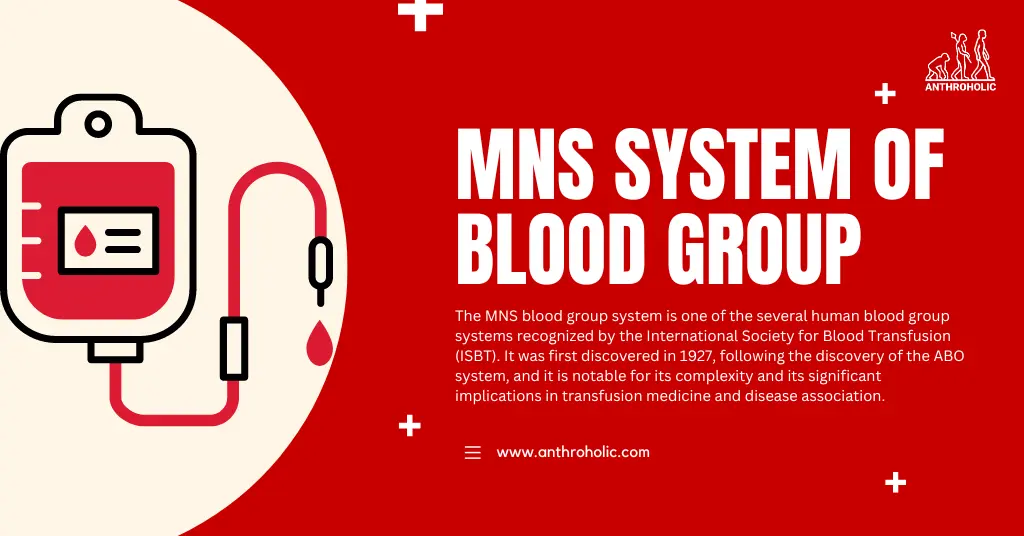AI Answer Evaluation Platform Live Now. Try Free Answer Evaluation Now
MNS Blood Group System
The MNS blood group system is one of the several human blood group systems recognized by the International Society for Blood Transfusion (ISBT) [1]. It was first discovered in 1927, following the discovery of the ABO system, and it is notable for its complexity and its significant implications in transfusion medicine and disease association.

MNS Blood Group System: An Overview
The MNS system, named after the first two antigens discovered, M and N, is second to the ABO system in terms of complexity. It currently consists of 46 antigens; however, the most important of these in terms of clinical relevance are M, N, S, s, and U.
Serological Basis of the MNS System
The serological behavior of the MNS system is intriguing:
- M and N antigens: M and N are antithetical antigens, meaning that if a person’s red blood cells express M, they will lack N, and vice versa. These antigens are found on glycophorin A (GYPA) and glycophorin B (GYPB), respectively [2].
- S, s, and U antigens: Similarly, S and s are antithetical and found on GYPB. U is almost universally present except in a few individuals.
Genetic Basis of the MNS System
The MNS antigens are produced by two co-dominant alleles, located on chromosome 4. These genes code for GYPA and GYPB proteins, which are the carriers of MNS antigens [3].
Clinical Significance of the MNS System
From a clinical standpoint, the MNS system has considerable importance:
- Transfusion reactions: Antibodies to MNS antigens can cause hemolytic transfusion reactions. This is particularly true for anti-M and anti-N antibodies, which can be naturally occurring or immune-stimulated.
- Hemolytic Disease of the Fetus and Newborn (HDFN): The S, s, and U antigens are implicated in HDFN. Anti-S and anti-U are notorious for causing severe HDFN.
Association of the MNS System with Diseases
The MNS system is also associated with some diseases:
- Malaria: There is a link between the MNS system and resistance or susceptibility to malaria. Specifically, the absence of the Glycophorin A gene (which carries the M antigen) has been associated with resistance to the Plasmodium falciparum parasite, which causes malaria.
- Norwalk virus infection: The M antigen may also play a role in susceptibility to Norwalk virus infection.
The MNS System in Population Studies
Population studies of the MNS system can provide valuable information about the migration and interrelation of different ethnic groups. The MNS system, due to its complexity and variable expression across different populations, has proven useful in anthropological research.
| Ethnic Group | M Frequency | N Frequency | S Frequency | s Frequency | U Frequency |
|---|---|---|---|---|---|
| Caucasians | 0.76 | 0.24 | 0.55 | 0.45 | >0.99 |
| African Americans | 0.72 | 0.28 | 0.31 | 0.69 | 0.98 |
| Asians | 0.77 | 0.23 | 0.52 | 0.48 | >0.99 |
| Hispanics | 0.75 | 0.25 | 0.54 | 0.46 | >0.99 |
Table 1: MNS antigen frequencies in different ethnic populations.
Conclusion
The MNS blood group system is a complex and intriguing system with substantial clinical and pathological implications. As our understanding of this system expands, so does our potential to improve transfusion medicine and our understanding of disease pathogenesis.
References
[1] ISBT: Science Series (2019). “Terminology for blood group antigens and genes—historical origins and guidelines in the new millennium.”
[2] Daniels G (2002). “Human Blood Groups.” Blackwell Science, Oxford. https://www.academia.edu/40827637/Human_Blood_Groups_2nd_ed_by_Geoff_Daniels
[3] Reid ME, Lomas-Francis C (2004). “Blood Group Antigen FactsBook.” Elsevier Academic Press.




